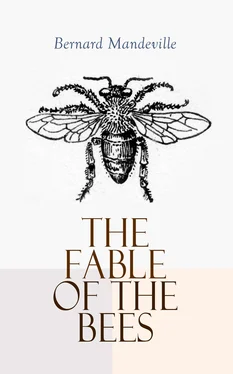This was (or at least might have been) the manner after which savage man was broke; from whence it is evident, that the first rudiments of morality, broached by skilful politicians, to render men useful to each other, as well as tractable, were chiefly contrived, that the ambitious might reap the more benefit from, and govern vast numbers of them with the greater ease and security. This foundation of politics being once laid, it is impossible that man should long remain uncivilized: for even those who only strove to gratify their appetites, being continually crossed by others of the same stamp, could not but observe, that whenever they checked their inclinations or but followed them with more circumspection, they avoided a world of troubles, and often escaped many of the calamities that generally attended the too eager pursuit after pleasure.
First, they received, as well as others, the benefit of those actions that were done for the good of the whole society, and consequently could not forbear wishing well to those of the superior class that performed them. Secondly, the more intent they were in seeking their own advantage, without regard to others, the more they were hourly convinced, that none stood so much in their way as those that were most like themselves.
It being the interest then of the very worst of them, more than any, to preach up public-spiritedness, that they might reap the fruits of the labour and self-denial of others, and at the same time indulge their own appetites with less disturbance, they agreed with the rest, to call every thing, which, without regard to the public, man should commit to gratify any of his appetites, vice; if in that action there could be observed the least prospect, that it might either be injurious to any of the society, or ever render himself less serviceable to others: and to give the name of virtue to every performance, by which man, contrary to the impulse of nature, should endeavour the benefit of others, or the conquest of his own passions, out of a rational ambition of being good.
It shall be objected, that no society was ever any ways civilized before the major part had agreed upon some worship or other of an over-ruling power, and consequently that the notions of good and evil, and the distinction between virtue and vice, were never the contrivance of politicians, but the pure effect of religion. Before I answer this objection, I must repeat what I have said already, that in this inquiry into the origin of moral virtue, I speak neither of Jews or Christians, but man in his state of nature and ignorance of the true Deity; and then I affirm, that the idolatrous superstitions of all other nations, and the pitiful notions they had of the Supreme Being, were incapable of exciting man to virtue, and good for nothing but to awe and amuse a rude and unthinking multitude. It is evident from history, that in all considerable societies, how stupid or ridiculous soever people’s received notions have been, as to the deities they worshipped, human nature has ever exerted itself in all its branches, and that there is no earthly wisdom or moral virtue, but at one time or other men have excelled in it in all monarchies and commonwealths, that for riches and power have been any ways remarkable.
The Egyptians, not satisfied with having deified all the ugly monsters they could think on, were so silly as to adore the onions of their own sowing; yet at the same time their country was the most famous nursery of arts and sciences in the world, and themselves more eminently skilled in the deepest mysteries of nature than any nation has been since.
No states or kingdoms under heaven have yielded more or greater patterns in all sorts of moral virtues, than the Greek and Roman empires, more especially the latter; and yet how loose, absurd and ridiculous were their sentiments as to sacred matters? For without reflecting on the extravagant number of their deities, if we only consider the infamous stories they fathered upon them, it is not to be denied but that their religion, far from teaching men the conquest of their passions, and the way to virtue, seemed rather contrived to justify their appetites, and encourage their vices. But if we would know what made them excel in fortitude, courage, and magnanimity, we must cast our eyes on the pomp of their triumphs, the magnificence of their monuments and arches; their trophies, statues, and inscriptions; the variety of their military crowns, their honours decreed to the dead, public encomiums on the living, and other imaginary rewards they bestowed on men of merit; and we shall find, that what carried so many of them to the utmost pitch of self-denial, was nothing but their policy in making use of the most effectual means that human pride could be flattered with.
It is visible, then, that it was not any heathen religion, or other idolatrous superstition, that first put man upon crossing his appetites and subduing his dearest inclinations, but the skilful management of wary politicians; and the nearer we search into human nature, the more we shall be convinced, that the moral virtues are the political offspring which flattery begot upon pride.
There is no man, of what capacity or penetration soever, that is wholly proof against the witchcraft of flattery, if artfully performed, and suited to his abilities. Children and fools will swallow personal praise, but those that are more cunning, must be managed with much greater circumspection; and the more general the flattery is, the less it is suspected by those it is levelled at. What you say in commendation of a whole town is received with pleasure by all the inhabitants: speak in commendation of letters in general, and every man of learning will think himself in particular obliged to you. You may safely praise the employment a man is of, or the country he was born in; because you give him an opportunity of screening the joy he feels upon his own account, under the esteem which he pretends to have for others.
It is common among cunning men, that understand the power which flattery has upon pride, when they are afraid they shall be imposed upon, to enlarge, though much against their conscience, upon the honour, fair dealing, and integrity of the family, country, or sometimes the profession of him they suspect; because they know that men often will change their resolution, and act against their inclination, that they may have the pleasure of continuing to appear in the opinion of some, what they are conscious not to be in reality. Thus sagacious moralists draw men like angels, in hopes that the pride at least of some will put them upon copying after the beautiful originals which they are represented to be.
When the incomparable Sir Richard Steele, in the usual elegance of his easy style, dwells on the praises of his sublime species, and with all the embellishments of rhetoric, sets forth the excellency of human nature, it is impossible not to be charmed with his happy turns of thought, and the politeness of his expressions. But though I have been often moved by the force of his eloquence, and ready to swallow the ingenious sophistry with pleasure, yet I could, never be so serious, but, reflecting on his artful encomiums, I thought on the tricks made use of by the women that would teach children to be mannerly. When an awkward girl before she can either speak or go, begins after many entreaties to make the first rude essays of curtseying, the nurse falls in an ecstacy of praise; “There is a delicate curtsey! O fine Miss! there is a pretty lady! Mamma! Miss can make a better curtsey than her sister Molly!” The same is echoed over by the maids, whilst Mamma almost hugs the child to pieces; only Miss Molly, who being four years older, knows how to make a very handsome curtsey, wonders at the perverseness of their judgment, and swelling with indignation, is ready to cry at the injustice that is done her, till, being whispered in the ear that it is only to please the baby, and that she is a woman, she grows proud at being let into the secret, and rejoicing at the superiority of her understanding, repeats what has been said with large additions, and insults over the weakness of her sister, whom all this while she fancies to be the only bubble among them. These extravagant praises would by any one, above the capacity of an infant, be called fulsome flatteries, and, if you will, abominable lies; yet experience teaches us, that by the help of such gross encomiums, young misses will be brought to make pretty curtesies, and behave themselves womanly much sooner, and with less trouble, than they would without them. It is the same with boys, whom they will strive to persuade, that all fine gentlemen do as they are bid, and that none but beggar boys are rude, or dirty their clothes; nay, as soon as the wild brat with his untaught fist begins to fumble for his hat, the mother, to make him pull it off, tells him before he is two years old, that he is a man; and if he repeats that action when she desires him, he is presently a captain, a lord mayor, a king, or something higher if she can think of it, till edged on by the force of praise, the little urchin endeavours to imitate man as well as he can, and strains all his faculties to appear what his shallow noddle imagines he is believed to be.
Читать дальше












